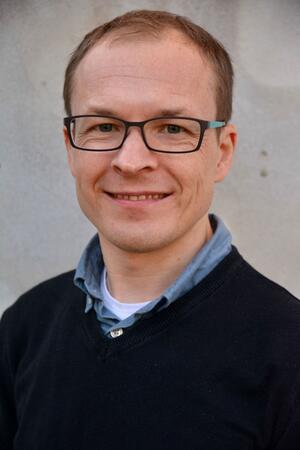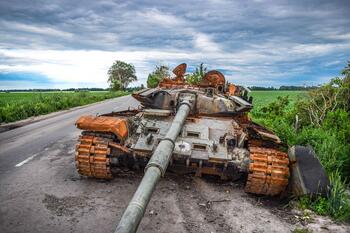By Leah Silvieus ’21 M.A.R.
In the summer of 2014, just as Ukrainian scholar Viacheslav “Slavik” Lytvynenko was finishing his Ph.D. in Greek patristics at Charles University in Prague, Russia invaded the east and south of Ukraine, eventually occupying Crimea. Donetsk Christian University, where Lytvynenko had previously served as a lecturer and where he had planned to resume teaching, was occupied almost immediately.
 “The faculty and staff were given three days to pack and leave, though in actuality they had only one day for everything,” Lytvynenko says. “The school was turned into a military base with artillery and tanks, and they used our storehouses for keeping Ukrainian war prisoners.”
“The faculty and staff were given three days to pack and leave, though in actuality they had only one day for everything,” Lytvynenko says. “The school was turned into a military base with artillery and tanks, and they used our storehouses for keeping Ukrainian war prisoners.”
The war that began that summer would alter the course of his life and career forever, says Lytvynenko, who is now at Yale Divinity School under the auspices of the Scholars at Risk program. The program provides a temporary, usually year-long, professional appointment to scholars, activists, writers, and artists who are facing persecution because of their work or another reason. The scholars might be fleeing from unsafe conditions or have been displaced and are looking for a permanent home. They receive financial support as well as personal and professional guidance from their host school or department at Yale.
After the invasion of Crimea, Lytvynenko’s family had nowhere to go in Ukraine and decided to stay in the Czech Republic. He was fortunate, he says, to receive a post-doc fellowship that year from the Evangelical Theological Faculty at Charles University. After he concluded that appointment, the university employed him as a research professor.
On February 24, 2022, when Russian President Vladimir Putin directed his forces to launch a major invasion of Ukraine, Lytvynenko felt compelled to do whatever he could to sway those who might have influence over stopping the war.
Since he knew both Russian and Ukrainian, he joined his Czech colleagues in writing and translating emails and sending open letters, calling for peace and support for Ukraine. He sometimes slept only three or four hours a night.
“The first two weeks of the war,” he remembers, “were very, very tough.”
They wrote to their colleagues in Russia and elsewhere and urged them to send the letters on to those they knew who might influence people who could stop the war. They even sent letters to the Kremlin, although he suspects they were never opened. Many of his Russian colleagues did forward the letters despite the active threats they were receiving.
“There was a feeling of solidarity among the scholars we were able to get together,” he says. “There were many people who wanted to stop the war, who believed that Ukraine is a sovereign country that cannot just be invaded by its big neighbor.”
Meanwhile, Lytvynenko and his wife were also working tirelessly to try to evacuate their extended family members and friends from east Ukraine. While many of his relatives moved to the Czech Republic or relatively safer places in central and western Ukraine, most of his cousins and uncles stayed. Several family members never got out.
“My mother-in-law died from cancer and was buried as the air-raid sirens were wailing in an almost empty city,” he says. “My brother-in-law died defending Mariupol in the south of Ukraine, on the coast of the Sea of Azov.”
Lytvynenko, who arrived in New Haven in March 2023 and whose appointment will run through April 2024, has continued to feel the reverberations of the war in his academic work. He has a Russian colleague in Moscow with whom he co-authored a book on the Trinitarian controversy in sixteenth-century Russia. The book was published earlier this year, he says, but sadly, his co-author took an anti-Ukrainian position and supported the war after the book had been written.
“It was difficult for me to accept, but I had to learn to live with that situation,” he says.
 Lytvynenko’s academic work came to a standstill as his attention shifted to protesting the war and the safety of his family. But the Scholars at Risk program has given him the opportunity to catch up on his research. While at Yale, he is co-authoring two books, co-editing two others, and writing several articles, most of which are related to the history of Christianity in the early and medieval eras. He is especially excited about a book in progress on the trinitarian controversy in early-modern Ukraine.
Lytvynenko’s academic work came to a standstill as his attention shifted to protesting the war and the safety of his family. But the Scholars at Risk program has given him the opportunity to catch up on his research. While at Yale, he is co-authoring two books, co-editing two others, and writing several articles, most of which are related to the history of Christianity in the early and medieval eras. He is especially excited about a book in progress on the trinitarian controversy in early-modern Ukraine.
As a historian, he says, his passion is to help scholars of Western Christianity understand how specific Christian texts from the early church were translated into Old Slavonic in the Middle Ages and thus shaped the Christian worldview of the Slavic people in Europe. He also wants to help Western historians learn about what was happening in Eastern Europe at the time when the West was experiencing the Protestant Reformation in the sixteenth century.
Even as Lytvynenko has resumed his scholarly work, his thoughts remain with Ukraine.
“I’ve been working a lot, but the difficulty for me, and I believe I’m not alone, is to do these things while the war continues,” he says. “It feels strange to write and teach while your countrymen are at war, and I constantly learn how to do my work with this in the background of my mind.”
As difficult as it is, he says, he has found solace in the community that has rallied around him. Since arriving in New Haven, Lytvynenko has been buoyed by the outpouring of support he sees for Ukraine, from colleagues speaking to him about Ukraine’s sovereignty to the Ukrainian flags he sees decorating houses and yards in New Haven neighborhoods.
“Whenever we’ve talked with people about Ukraine, we have seen a lot of sympathy and support, and we feel very grateful,” he says. “My wife and I have felt very warmly welcomed, and we have also found that it’s very easy to befriend people in this culture.”
To learn more about Yale’s Scholars at Risk program, please visit the Yale and the World website.